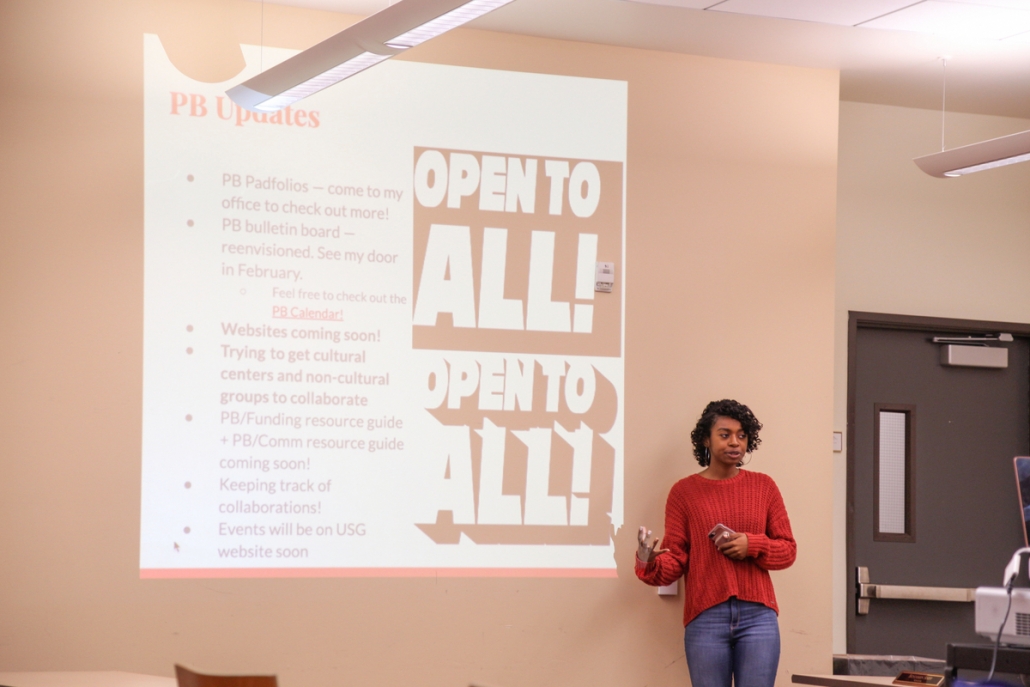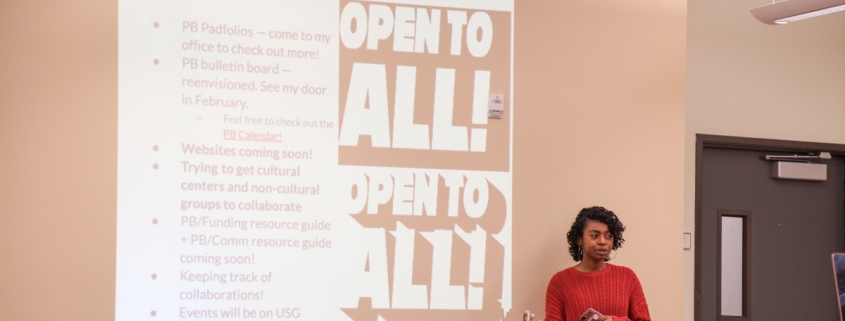USG executive officer removed

Former Undergraduate Student Government Executive Officer Montana Houston was removed from her position as senior director of programming Tuesday following violation of USG policy and complaints from USG-affiliated assemblies. The decision came after several assemblies under the programming branch sent a joint statement to the executive cabinet outlining frustrations with her proposed amendment regarding the incorporation of new assemblies.
President Trenton Stone would not disclose the circumstances of the violation.
Houston’s proposed amendment would change how future assemblies are incorporated within the programming branch and how they are differentiated from committees.
The original bylaw, which was approved in a USG meeting in early February, stipulated that for an assembly to be recognized under USG, the organization would have to provide either the signatures of five presidents of member organizations looking for incorporation or a petition signed by one registered student organization president and 50 or more current undergraduate students. Houston’s amendment, in reference to this section, would eliminate the second option.
Assemblies, such as the Latinx Student Assembly and the Queer and Ally Student Assembly, drafted and signed the letter sent to Stone and Vice President Mahin Tahsin after Tuesday’s Senate meeting. LSA and QuASA declined to comment further on the complaints outlined in the letter.
Houston expressed concern that the new process of incorporating assemblies would place a financial burden on the programming branch and make it difficult to accommodate the needs of existing committees.
Stone said Houston’s removal was decided by a majority vote of executives after the joint statement requested their official intervention. This process is guided by the USG bylaws, which outline the removal of a presidentially appointed USG member by the executive cabinet.
Stone declined to comment on the content of the complaints, citing professional courtesy, but mentioned that they had been brought to the attention of the cabinet on multiple occasions.
“We’ve had conversations in the past over numerous weeks, the fall semester and spring semester,” Stone said. “And this is the first formal complaint from the group as a whole. But there have been conversations and attempts to make adjustments over a number of weeks.”
Houston assumed the senior director of programming position in February 2019 after she was appointed by Stone and Tahsin following their election win.
Houston said she received disparaging treatment from USG members for her opinions on changing the bylaws, referencing a hostile work environment.
“I was a target because I kind of supported different views, and I was targeted personally about my intelligence by my fellow [executive] members,” Houston said. “The sentiment grew from a very intellectual discourse that was really respectful.”
Stone said there will be another executive cabinet meeting to discuss USG’s contingency plan for fulfilling the regular responsibilities of the senior director of programming for the remainder of the semester. In the meantime, he said it was important to maintain this professional courtesy for Houston while also being transparent about the presidential removal process.
“I think there’s a balance of respecting the privacy of [Houston] and the different things that have occurred, as well as the privacy of the programming directors and assistant directors that sent the dissent letter,” Stone said. “There’s no requirement for us to [notify] the entire organization or the student body by any means, but I think [it is] in the best interest of just keeping everyone in the loop and trying to be communicative.”
Eleonora Viotto, director of the Political Student Assembly, said the assembly signed the letter along with other cultural groups in solidarity with organizations that benefit from the bylaw, including the Native American Student Union.
“We signed on because we firmly believe that USG and its programming board should be as inclusive and as diverse as possible,” Viotto said. “We loved the amendment that [the] Senate had voted on to promote that inclusivity and diversity and wanted to make sure the language remains the same.”
NASU members presented their support of the resolution in the February meeting’s open forum, acknowledging their appreciation of the opportunity to take advantage of more resources guaranteed by USG recognition.

